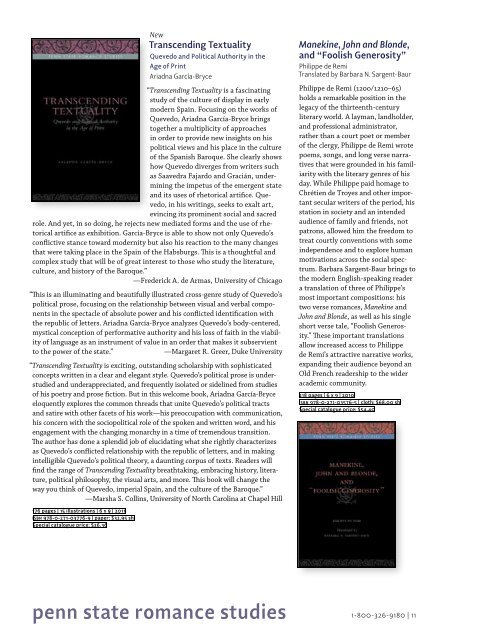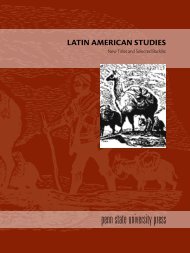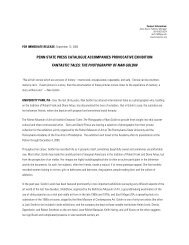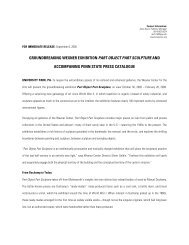Download the Catalog (PDF) - Pennsylvania State University Press
Download the Catalog (PDF) - Pennsylvania State University Press
Download the Catalog (PDF) - Pennsylvania State University Press
Create successful ePaper yourself
Turn your PDF publications into a flip-book with our unique Google optimized e-Paper software.
New<br />
Transcending Textuality<br />
Quevedo and Political Authority in <strong>the</strong><br />
Age of Print<br />
Ariadna García-Bryce<br />
“Transcending Textuality is a fascinating<br />
study of <strong>the</strong> culture of display in early<br />
modern Spain. Focusing on <strong>the</strong> works of<br />
Quevedo, Ariadna García-Bryce brings<br />
toge<strong>the</strong>r a multiplicity of approaches<br />
in order to provide new insights on his<br />
political views and his place in <strong>the</strong> culture<br />
of <strong>the</strong> Spanish Baroque. She clearly shows<br />
how Quevedo diverges from writers such<br />
as Saavedra Fajardo and Gracián, undermining<br />
<strong>the</strong> impetus of <strong>the</strong> emergent state<br />
and its uses of rhetorical artifice. Quevedo,<br />
in his writings, seeks to exalt art,<br />
evincing its prominent social and sacred<br />
role. And yet, in so doing, he rejects new mediated forms and <strong>the</strong> use of rhetorical<br />
artifice as exhibition. García-Bryce is able to show not only Quevedo’s<br />
conflictive stance toward modernity but also his reaction to <strong>the</strong> many changes<br />
that were taking place in <strong>the</strong> Spain of <strong>the</strong> Habsburgs. This is a thoughtful and<br />
complex study that will be of great interest to those who study <strong>the</strong> literature,<br />
culture, and history of <strong>the</strong> Baroque.”<br />
<br />
—Frederick A. de Armas, <strong>University</strong> of Chicago<br />
“This is an illuminating and beautifully illustrated cross-genre study of Quevedo’s<br />
political prose, focusing on <strong>the</strong> relationship between visual and verbal components<br />
in <strong>the</strong> spectacle of absolute power and his conflicted identification with<br />
<strong>the</strong> republic of letters. Ariadna García-Bryce analyzes Quevedo’s body-centered,<br />
mystical conception of performative authority and his loss of faith in <strong>the</strong> viability<br />
of language as an instrument of value in an order that makes it subservient<br />
to <strong>the</strong> power of <strong>the</strong> state.” <br />
—Margaret R. Greer, Duke <strong>University</strong><br />
“Transcending Textuality is exciting, outstanding scholarship with sophisticated<br />
concepts written in a clear and elegant style. Quevedo’s political prose is understudied<br />
and underappreciated, and frequently isolated or sidelined from studies<br />
of his poetry and prose fiction. But in this welcome book, Ariadna García-Bryce<br />
eloquently explores <strong>the</strong> common threads that unite Quevedo’s political tracts<br />
and satire with o<strong>the</strong>r facets of his work—his preoccupation with communication,<br />
his concern with <strong>the</strong> sociopolitical role of <strong>the</strong> spoken and written word, and his<br />
engagement with <strong>the</strong> changing monarchy in a time of tremendous transition.<br />
The author has done a splendid job of elucidating what she rightly characterizes<br />
as Quevedo’s conflicted relationship with <strong>the</strong> republic of letters, and in making<br />
intelligible Quevedo’s political <strong>the</strong>ory, a daunting corpus of texts. Readers will<br />
find <strong>the</strong> range of Transcending Textuality breathtaking, embracing history, literature,<br />
political philosophy, <strong>the</strong> visual arts, and more. This book will change <strong>the</strong><br />
way you think of Quevedo, imperial Spain, and <strong>the</strong> culture of <strong>the</strong> Baroque.”<br />
<br />
—Marsha S. Collins, <strong>University</strong> of North Carolina at Chapel Hill<br />
176 pages | 15 illustrations | 6 x 9 | 2011<br />
isbn 978-0-271-03776-9 | paper: $32.95 sh<br />
Special catalogue price: $26.36<br />
Manekine, John and Blonde,<br />
and “Foolish Generosity”<br />
Philippe de Remi<br />
Translated by Barbara N. Sargent-Baur<br />
Philippe de Remi (1200/1210–65)<br />
holds a remarkable position in <strong>the</strong><br />
legacy of <strong>the</strong> thirteenth-century<br />
literary world. A layman, landholder,<br />
and professional administrator,<br />
ra<strong>the</strong>r than a court poet or member<br />
of <strong>the</strong> clergy, Philippe de Remi wrote<br />
poems, songs, and long verse narratives<br />
that were grounded in his familiarity<br />
with <strong>the</strong> literary genres of his<br />
day. While Philippe paid homage to<br />
Chrétien de Troyes and o<strong>the</strong>r important<br />
secular writers of <strong>the</strong> period, his<br />
station in society and an intended<br />
audience of family and friends, not<br />
patrons, allowed him <strong>the</strong> freedom to<br />
treat courtly conventions with some<br />
independence and to explore human<br />
motivations across <strong>the</strong> social spectrum.<br />
Barbara Sargent-Baur brings to<br />
<strong>the</strong> modern English-speaking reader<br />
a translation of three of Philippe’s<br />
most important compositions: his<br />
two verse romances, Manekine and<br />
John and Blonde, as well as his single<br />
short verse tale, “Foolish Generosity.”<br />
These important translations<br />
allow increased access to Philippe<br />
de Remi’s attractive narrative works,<br />
expanding <strong>the</strong>ir audience beyond an<br />
Old French readership to <strong>the</strong> wider<br />
academic community.<br />
218 pages | 6 x 9 | 2010<br />
isbn 978-0-271-03576-5 | cloth: $68.00 sh<br />
Special catalogue price: $54.40<br />
penn state romance studies<br />
1-800-326-9180 | 11
















